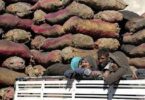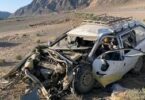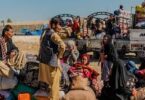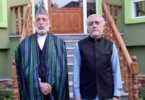Monitoring Desk
KABUL: The Jamiat Islami Afghanistan (JIA) party leadership council on Sunday denounced the Taliban’s expectation that the Afghan Army would be dissolved after a peace deal with the US.
The party also said some of its members had joined electoral tickets for their personnel interests.
Recently Taliban’s chief negotiator in Qatar Abbas Stanikzai in a video clip said the 17-year old Afghan army, police and intelligence personnel would breakdown with the US forces pullout from the country.
Syed Ibrahim Amad, head of the JIA leadership council who had parted ways with the JIA led by Salahuddin Rabbani, said: “The Afghan National Army is comprised of the real sons of the land and the institution is like our heart and soul. We support the army and are totally against its dissolution.”
He said the people of Afghanistan specially the JIA leadership council would not stay silent on this demand of the Taliban and would strongly react.
“Unfortunately we have unreliable neighbours who want a weak Afghanistan. The dissolution of army is not the demand of the Taliban but a dream of the intelligence networks of the region,” he said.
Amad said: “We want peace which protects the achievements of the past 17 years. Peace is a national need and there is consensus on it as well,” he said.
Electoral Alliances:
Referring to the presidential elections, Amad said members of the JIA, who had joined different electoral alliances, wanted to promoted their own personal interests.
Atta Mohammad Noor, Mohammad Younis Qanoni, Mohammad Ismael khan, Bismillah Mohammadi, Sattar Murad and some other renowned JIA members have joined Mohammad Hanif Atmar in his race for the presidency.
But Salahuddin Rabbani and some others JIA leaders support Dr. Abdullah and others presidential hopeful Sahida Abdali.
But Ahmad Walli Massoud, the brother of Ahmad Shah Massoud, has launched his own electoral team running for the presidency.
Amad criticized mismanagement within the JIA and said if differences were not resolved, they would become huge. (Pajhwok)






